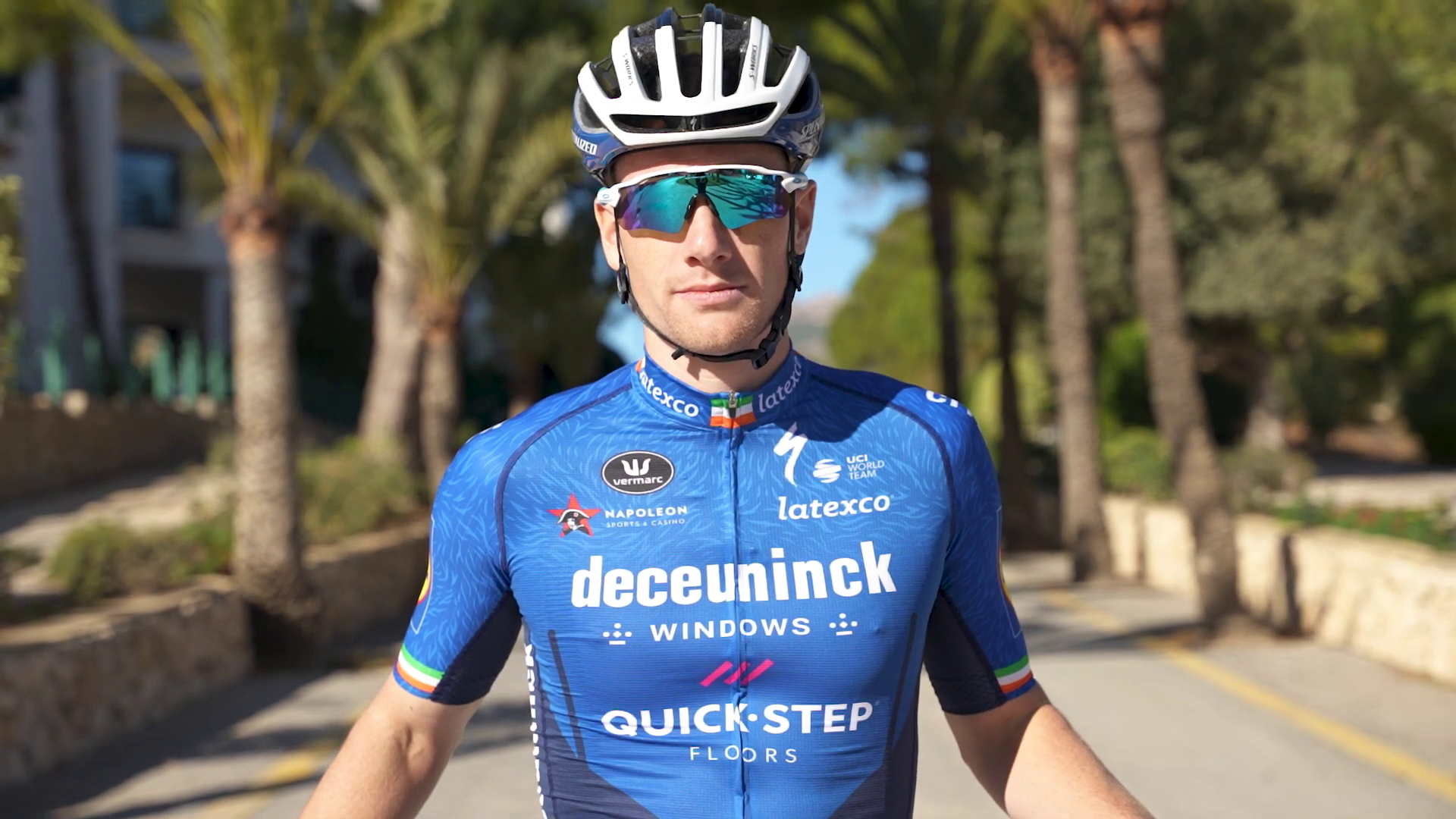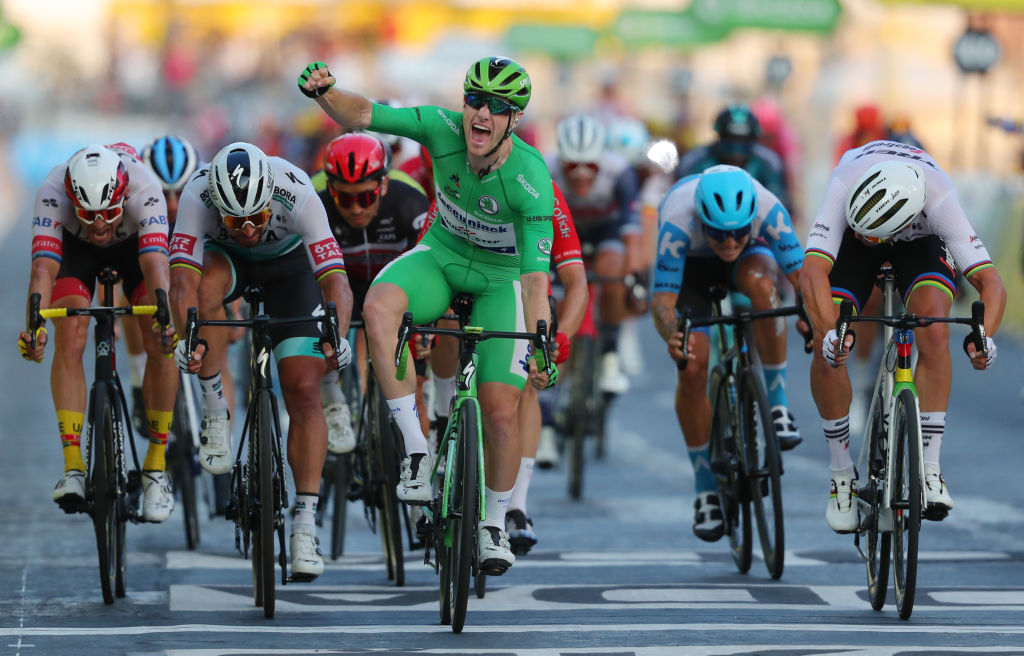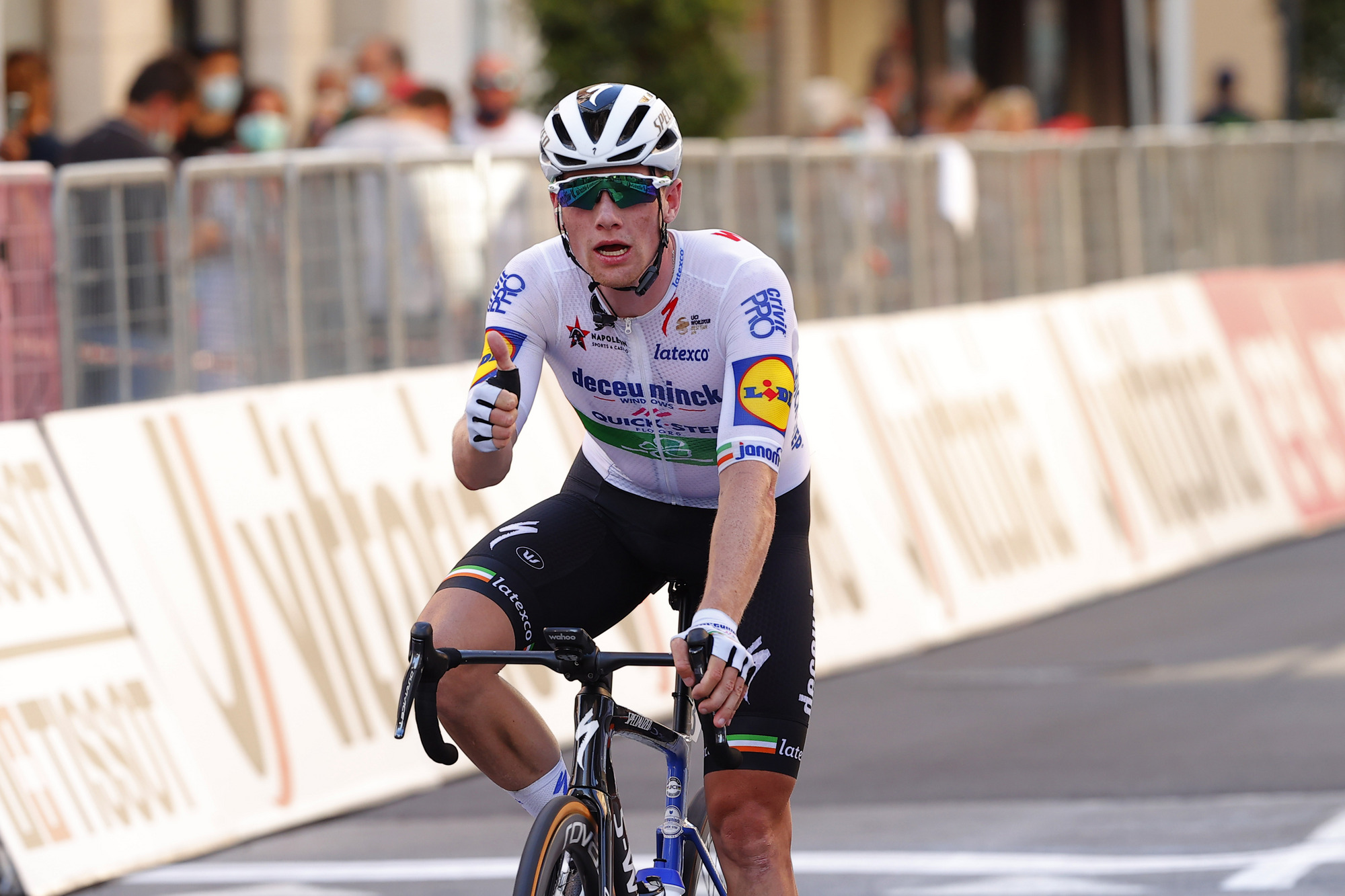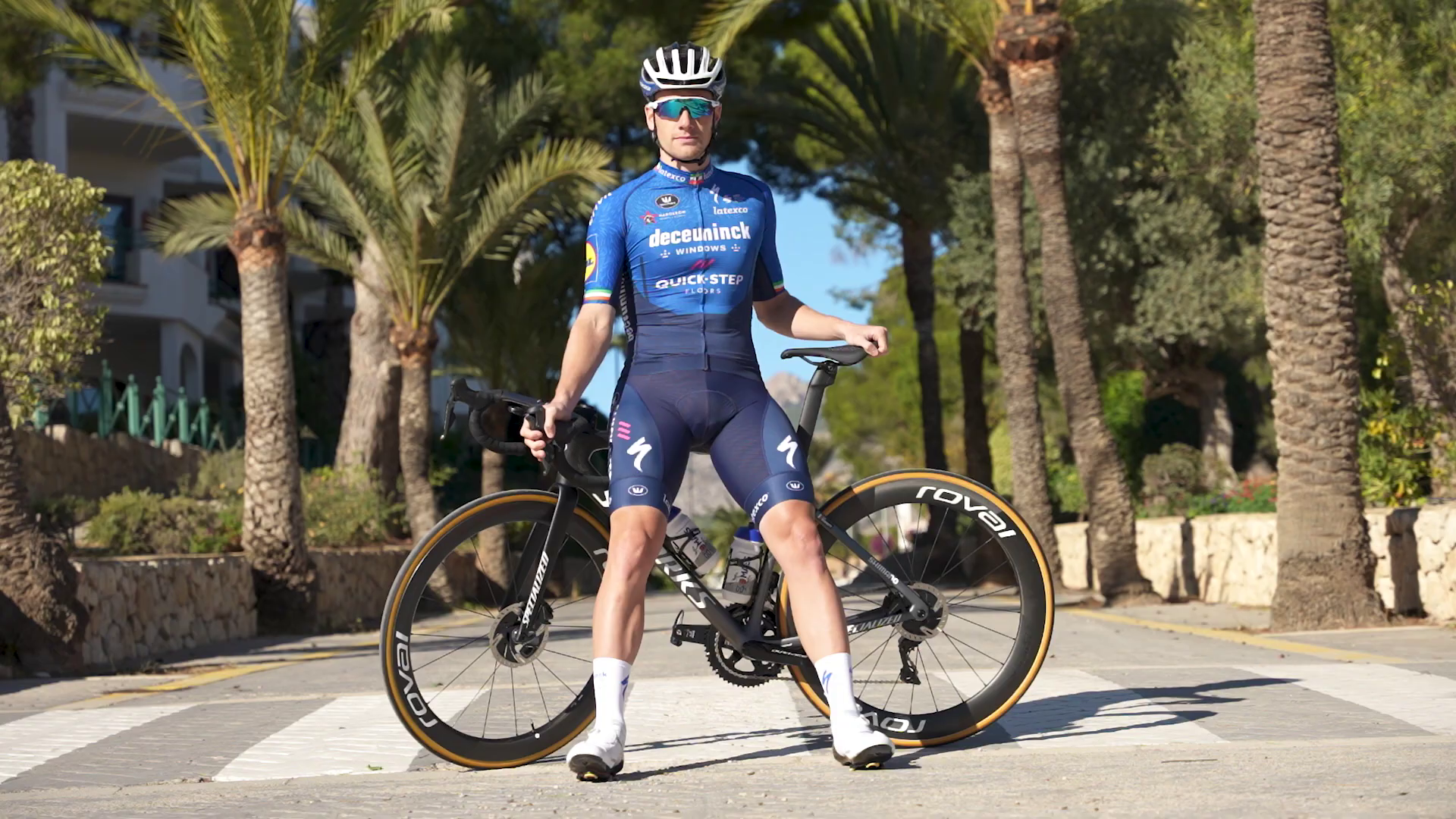Sam Bennett: I don't know if I'm the best sprinter or not
Irishman on confidence, learning and looking forward to 2021

The walls of the Deceuninck-QuickStep service course in Wevelgem are decorated with the spoils of campaigns past. For an incoming rider, the feeling must be akin to that of a new signing touring the football museums at the Old Trafford or the Bernabéu stadiums. History can be inspiring and daunting in equal measure, as Sam Bennett found when he visited his new team’s headquarters for the first time last winter.
"I walked into the office and I saw all the bikes from previous big riders and the jerseys. There are the world champions’ bikes, the Paris-Roubaix-winning bikes, I think there’s a green jersey there from Tom Boonen… There’s all these amazing results and all the bikes there from them. I walked in and I just got so intimidated,” Bennett reveals to Cyclingnews.
“I wondered, how am I going to do anything to show that I’m good enough to be in this position? I didn’t think that I’d do something big to put a bike there, but I just wanted to justify my position.”
Such an admission of vulnerability would have been unthinkable from some more self-regarding fast men of yesteryear, but maybe it’s only in keeping with a man who has never professed to know all the answers in advance. As a junior in Carrick-on-Suir, Bennett already possessed the raw physical gifts to win bike races but he had the humility to realise he could win much more if he sought the counsel of wiser men, asking Carrick Wheelers clubmate and coach Martin O’Loughlin if he might teach him how to sprint.
O’Loughlin obliged and Bennett announced himself by winning a stage of the Rás as a teenager in 2009. The rest ought to have been a straightforward tale of upward progression but Bennett’s trajectory was flattened considerably by injury and misfortune during his amateur career. As a result, he spent longer than he ought to have done toiling in the minor leagues in the colours of An Post, before eventually rising to the Pro Continental ranks with NetApp in 2014.
By the following summer, Bennett had reached the big time, making his Tour de France debut, but even there, his tendency towards introspection and fierce self-criticism came to the fore. A bout of illness meant he had scarcely trained in the month before the Grand Départ, but he still survived as far as stage 17 before climbing off.
It was, in the circumstances, a considerable feat of endurance, not that Bennett saw it that way.
The latest race content, interviews, features, reviews and expert buying guides, direct to your inbox!
“I don’t like being one of the guys that TV shows when they switch to the back of the bunch,” he said at the time.
A year later, he made it to Paris, but a heavy fall on the opening stage ensured that he made little impact in the sprints.
“I don't want to feel sorry for myself,” he said then. “I feel like I need to harden the fuck up.”
Bennett would only return to the Tour last August. In the intervening period, he had established himself as one of the peloton’s outstanding sprinters and made the high-profile transfer from Bora-Hansgrohe to Deceuninck-QuickStep, but his penchant for critical self-assessment remained resolutely intact.
“I gave the other guys a lead-out,” he said despondently after placing second in Sisteron on stage 3. Later, Bennett confessed to staring at his ceiling until 3am after flipping off the lights each night in the opening week, rehashing the opportunities missed in his mind’s eye.
Many would have wilted under such pressure, but Bennett seemed almost to feed off it, eventually opening his Tour account – and the emotional floodgates – at Ile-de-Ré on stage 10.
“I think I’m hard on myself: when I see a mistake or a problem, I don’t shy away from it, I like to acknowledge it, learn from it, make it better and try to move on,” Bennett says now.
“I think sometimes what happens is that people can take my honesty for weakness, but I’m just honest: I’m still going to go out and I’m going to give it 110% the next day. I think I’m really honest, but I’m also pretty stubborn.”
A sports psychologist would surely laud Bennett’s ability to appraise disappointments so frankly and then digest them just as quickly, but, perhaps surprisingly, it’s not something he has ever discussed with an expert in the field.
“I think I figured it out for myself. Deceunick-QuickStep have their own sports psychologist, but he’s really chilled out and we just have conversations – unless he’s getting into my head without me noticing, I don’t know!" Bennett says. "I enjoy having conversations with him, but I think it’s more about getting me to interact with the team more.”
Bennett completed his first clean run at a Tour de France by carrying the green jersey all the way to Paris, capping his race with a second stage win on the Champs-Élysées. He would add another stage victory at the Vuelta a España a month later, and he ended the season with seven wins. By any analysis – including that of Cyclingnews – the Irishman was the year’s best sprinter, even if he is reluctant to claim the tag for himself.
“It’s funny. I always thought the Tour was where people judge if you’re a top sprinter or not, and I won the green jersey, but I still kind of feel the same, you know? So I don’t know… It’s a massive compliment and I really appreciate it, but I don’t know if I am or not,” says Bennett, who will only concede that his 2020 successes have made him more confident in his own abilities.
“I think what I got from the year is that I feel more comfortable in the position I’m in. Before I maybe felt, ‘Oh, I’m out of my depth here, riding for Deceuninck-QuickStep, maybe I’m not good enough.’ It gave me more confidence that I can handle the position I’m in.
“There’s plenty of fast guys out there and I’m probably not the quickest, but at the end of the day, I just have to get to the line first. There’s a lot more to it, with tactics and positioning and just being strong in the race in general, to be able to sprint at the end, so maybe I think I’m up there. But I don’t know if I’m the best or not.

The introvert sprinter
When Bennett signed on the dotted line with Patrick Lefevere last winter, the expectation was that he would at least match the lofty minimum requirement fulfilled by the men who had preceded him in QuickStep’s lineage of marquee sprinters. As Bennett put it before the Grand Départ in Nice: “I don't want to be the first sprinter in QuickStep's history who can't win in the Tour.”
Bennett showcased his physical condition in the run-up to the delayed Tour with victories at the Vuelta a Burgos and Tour de Wallonie, but even as the race began, he was still adapting to the vagaries of a new lead-out train that had, by default, thrust him into an unfamiliar role. Almost by definition, Deceuninck-QuickStep’s lead sprinter is a lodestar for everybody else. Riding behind men like Michael Mørkøv and Kasper Asgreen is an undoubted advantage, but it also meant there was now nowhere to hide.
“I mean, it was a completely different approach to how I’d done sprints before,” Bennett says. “Before, I just asked the guys to get me within 1k and put me on a certain guy’s wheel, and I’d just fight really hard and try to time it off them. That person was a point of reference. But then when I came to Deceuninck-QuickStep, I became the point of reference. People were looking for our wheel. I didn’t have someone else to time it off. That was a big change.
“I know I’m getting a lead-out, but when you’re second wheel or third wheel in the closing metres, you’re taking more wind than the guy sitting behind you, so it’s about being strong enough to be able to take that and then still sprint.”
The pandemic-induced hiatus in spring and early summer hardly helped the adaptation. Bennett was only trying out his new clothes for size when he scored two early wins in Australia, but the tailoring process had to start again almost from scratch when the season resumed in August. The finishing touches were only applied in the Tour’s opening week, before Bennett stitched together the biggest wins of his career.
“The interruption didn’t help, but it’s a position I’d been fighting my whole career for, so I enjoyed the challenge and I enjoy being in this position and I think it got better as the season went on,” Bennett says. “Really, it took until the Tour – and a week or two into the Tour – for it to flow more naturally. It took a long time, but in the end, it came really good.”
Bennett and his previous team had effectively grown up together, as he developed from winning minor races at NetApp to claiming WorldTour victories at the revamped Bora-Hansgrohe. Arriving at Deceuninck-QuickStep, by contrast, meant stepping into an environment where the culture had already been defined long before his arrival. The self-effacing Bennett was more than content to blend in rather than take over.
“It’s strange, because it’s a team with a lot of big riders and everybody can win a race here, so it wasn’t like I was coming in to be The Man. I was coming in to be part of a strong unit,” he says.
“I kind of like that. I’m not the guy who’s going to take over the atmosphere in a room or be the head of the table and the centre of conversation. I’m just kind of like… I’m a bit more of an introvert.”

“I’m more comfortable with my age now"
Bennett turned 30 two days after placing a disappointed eighth at Scheldeprijs in October, and he acknowledges that the milestone might have registered more urgently had he not been enjoying a career year.
“I wanted to win a stage of the Tour before I turned 30, so this year definitely made turning 30 a lot, lot easier as a sprinter,” he laughs.
“I’m more comfortable with my age now. I’d be lying if I said it’s not something at the back of my mind, but I feel like I’ve only got to the level now and I don’t want to already lose it just when I got here. I know every athlete says it, but I don’t feel 30. I was pretty late in getting to this level. I think it was only the Giro in 2018 that I discovered myself, and what was I then? 27?”
Received wisdom says that sprinters start to lose some of their speed once they enter their fourth decade. True or not, Bennett will hope that his own physical profile can protect him from a drop in production in the immediate future. Although he makes his living as a sprinter, his victories perhaps owe more to strength than to pure speed. Think, for instance, of his winning efforts from distance at Imola on the 2018 Giro d’Italia or in Oviedo at the 2019 Vuelta, not to mention his kilometre-long burst at last year’s Vuelta a Burgos.
“I don’t have high lactate building rate. I have a VO2 max that’s higher than most sprinters, so my approach to sprinting isn’t like a normal sprinter. I have to work on my engine and be really fit to be able to sprint,” Bennett explains.
“From age 20 to 27, I said, ‘I’m a sprinter, I have to work on my sprint,’ but I never really got any quicker. Then I stopped doing sprint training, and I did hours and strength efforts instead, and all of a sudden, I was getting to the finish fresher and I was winning races.
“I tried to go back to doing sprint work afterwards, but I wasn’t able to produce the power at the end of races because I was too tired. That seems to be the way I have to train to be up there, rather than working on my sprint, so hopefully I’m grand for another few years.”

Ambitions for 2021
The ongoing pandemic has already lightened the racing calendar in January and February, but while it is difficult to sketch out 2021 plans in granular detail, the broad brushstrokes of Bennett’s season are in place. Improving on his modest track record at Milan-San Remo and Gent-Wevelgem will be a target, as will winning a one-day WorldTour race of any description, while the Tour de France will again be the centre-piece of his campaign.
“I never seem to have hit top form for Milan-San Remo, I always came in just under where I needed to be, so to get there and finally perform would be great,” he says. “I’ve got closer in the last two years to being in the final, but I wasn’t strong enough. I know if I was on my peak, I could get over the Poggio pretty well – maybe not attacking with the guys, but I would definitely be in the bunch.”
At the Tour, meanwhile, Bennett is reluctant to commit to the idea defending his points competition title before the race begins. As in 2020, he will set out with the aim of winning a stage. Any eventual green jersey challenge will materialise organically.
“I’ll definitely be looking for stages because there’s more bunch sprints this year, and then we’ll see how I’m going in the points classification before I really make a decision,” he says.
“It will depend also on what the team want me to do, because it was bloody hard to go for the green jersey and I think it takes away that extra little bit when you’re trying to win stages.”
Deceuninck-QuickStep made a late addition to their roster in December when they announced that Mark Cavendish would return to the team in 2021, though the Manxman’s precise role is not entirely clear after his travails with illness and injury in recent years. Bennett, whose status on the team is hardly in doubt, was not perturbed by the arrival of another fast men.
“I think it’s great for Cav. For somebody with so much success and history in the sport, I don’t think it would have been right just to finish this year,” Bennett says.
“I don’t know what way he wants to approach it, but it would be great to see him be successful again. I’m sure there are plenty of races to go around, I think everybody gets their opportunity.”
Marcel Kittel has suggested that Bennett will benefit from Cavendish’s experience and expertise this season, though one wonders what more a winner on the Champs-Élysées has left to learn about the art of sprinting. Plenty, insists Bennett, who still gets feedback from his original sprint mentor Martin O’Loughlin and his former An Post directeur sportif Kurt Bogaerts.
“I’m always making little mistakes and they’re always the ones to catch me on it. I’ll always be the kid to them. It doesn’t matter if I have the green jersey or not, they’ll still tell me off if I do something wrong,” he says.
“I don’t think you’re ever done learning. The minute you stop is the minute you don’t improve because the sport is always evolving. You have to keep going with the times. I’m not going to be the guy who’s stubborn and doesn’t listen to people. I try to listen to everybody. If I see information I like, I take it in. If not, I say yeah, and forget about it. But I’ll always listen.”
Bennett, it seems, is quick to apply the lessons learnt. The proof is mounted on the wall in Wevelgem.
“My green bike is the first bike you see when you walk into the office now,” he says. “It was a really proud moment for me, to feel worthy of being in the team, when a few months earlier, I was completely intimidated by that room."

Barry Ryan was Head of Features at Cyclingnews. He has covered professional cycling since 2010, reporting from the Tour de France, Giro d’Italia and events from Argentina to Japan. His writing has appeared in The Independent, Procycling and Cycling Plus. He is the author of The Ascent: Sean Kelly, Stephen Roche and the Rise of Irish Cycling’s Golden Generation, published by Gill Books.